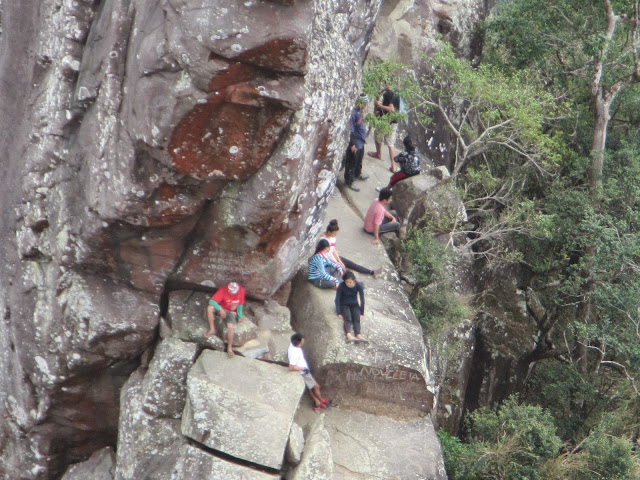Location: Barangay Suba, Paoay, Ilocos Norte, Philippines
Updated: November 2019
Note: The original post of this blog has been pushed down presenting the most recent on top pages.
The spacious living room at the second floor of the mansion
The Malacanang of the North is famous as the official residence of the family of the late Ferdinand Edralin Marcos, when he was still in power, who is the 10th president of the Republic of the Philippines with his term covering the period from 1965 to 1986. It was now maintained by the local government as a presidential museum.
The main entrance to the palace
This structure is a two-storey mansion built facing the magnificent Paoay Lake, with a total of seven spacious rooms with high architectural value where each room marvelously showcases of a specific theme of historical events from the Marcos era: Study, Agriculture, Diplomacy, OFW (overseas Filipino workers), Culture, Nation Building and Family.
The serene Paoay Lake as viewed from the mansion
The presence of the Paoay Lake near the mansion provides a soothing feeling for any guest who will visit the place, accentuated by the evergreen spacious lawn fronting the mansion.
The mansion's facade
The mansion's facade may seem odd and old at a distance, but once you get inside and see its interior, you will be amazed of how magnificent the designs are ranging from the paintings, chandeliers, ceilings, mirror-like shiny wooden floors, furniture and fixtures and other interior elements.
Outside the mansion is the Centro Mart convenience store where guests can buy their personal needs like refreshments and snacks, condoms, pampers, ladies' napkins, etc. There is also a cart waiting just next to the main entrance selling buco fruit.
The following pictures are the palace's interior design:
The spiraling wooden stairs to the second floor
The large capiz window overlooking the lake at the second floor
A conference hall or a dining room
Another angle picture of the room with the Paoay Church painting on the wall
This is one of the rooms in the mansion
The living room of the mansion
The living room captured connecting to the balcony at the right overlooking the lake
Another spacious bedroom in the mansion
Still a part of the function hall
The function room taken in another angle with emphasis on the posts leading to the living room
Another bedroom of the mansion
Refreshing myself from the cool breeze coming from the lake
Our whole group headed by my boss, Mrs. Lucia Llego at the living room
Not willing to leave the mansion without a picture in this magnificent Paoay Church painting
Touring around and inside the palace would make one realize that there is a gem in this part of the Philippines showcasing a rich culture, history and architectural masterpiece.
Just a short drive away, we dropped by on the Paoay Lake's Terrazas, where this establishment have boats for rentals in case guests wanted to cruise the lake with a choice of boat pedals or kayak.
Pedal boat and Kayak are available for rental
Savor their local specialties Ice cold halo-halo and the piping hot empanadas
Souvenirs and other local delicacies are available also can be bought here

Malacanang Palace of the North is also called Malacanang ti Amianan, located in Barangay 15 of Suba in Paoay of the province of Ilocos Norte, the former official residence of the President Ferdinand Marcos and his family when they are in Ilocos Norte though Marcos was born in Sarrat and they have a house in Batac. This 5-hectare property nestled partly near the banks of Paoay Lake. From its wide windows, the magnificent and cool scenery of the lake can be viewed in all its glory. When Marcos was still in power, the province was dubbed to be a “Marcos country”.

This is just one of the 29 houses the former First Family built when they were still in power till Marcos was deposed in 1986 and a few years later, this palace was transformed into a museum as part of his memorabilia.

This palace has consistently been considered by tourists to be a part of their itinerary when visiting the Ilocos region. To maintain this museum, it is being managed by the Department of Tourism where entrance fee is charged at P20 and P10 for adults and children, respectively. It is open from 9:00 to 11:30 A.M. and 1:00 to 4:30 P.M. daily except for Mondays. Opposite this museum is restaurant and convenience store also selling souvenir items. Few local vendors are selling buco and few variety of local fruits just outside its gate.

HOW TO GET THERE
This tour package is a part of my Ilocos Sur - Ilocos Norte Trip, just refer to my earlier post of Paoay Church for it will be a big help.



































































